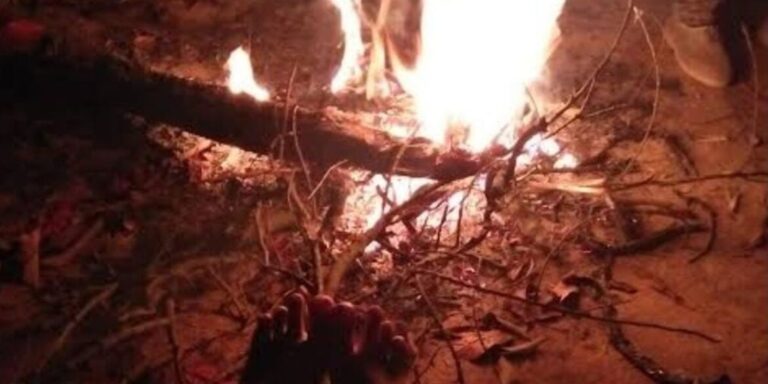Timir was a quiet boy. He always did well in his studies. His large liquid dark eyes always seemed to observe the world around him with an attached detachment. His parents, teachers and other elders used to say he was wise beyond his years. His father, in particular, was worried about his health and well-being because Timir showed no interest in games and sports but preferred to spend his time reading.
As time passed, Timir got admission into the best college in his state and went on to do his post-graduation in two of the best universities in the world, one in Europe and the other in the US. His subject of study was history, and his PhD was on the Intellectual Property Rights of Indigenous People. The Society for the Study of Indigenous People and their Rights and Privileges based in Washington offered him a fellowship immediately after he finished his PhD.
It seemed to everyone that Timir would accept this fellowship and have a successful academic career in the US. As it was, he had made many friends in elite academic circles across three continents during his study and research. His parents had already picked out a beautiful Bengali bride for him from an educated family. She was doing her post-graduation in Anthropology at Jadavpur University.
To everyone’s surprise, Timir did not accept any position abroad but returned home after completing his PhD. He met Shampa, the girl chosen for him by his parents, a few times, and they seemed to get on very well together. However, both Shampa’s parents and Timir’s parents got shocked when Timir and Shampa one day got them together over a meal and announced that they would like to get married within a month and then proceed to Santhal Parganas in Bihar to work with a famous lady poet, writer, activist and social worker who had formed a small village commune in a little known village named Sakhuapaani in Pakur District, close to the Bengal border and the Farakka Dam.
Once the young people had decided, there was very little the parents could do to dissuade them. The parents were happy that Timir and Shampa were ready to settle into an arranged marriage though their financial future seemed quite uncertain. And thus it was that on 1 September 2012, Timir and Shampa Roy, aged 28 years and 22 years, arrived early in the morning at Pakur Railway Station by train from Kolkata. They were received by a cheerful young tribal boy, Sunil Hansda, at the Station. All three then took a trekker ride to Jamsudih, where the motorable road ended, and began a nearly two-kilometre trek via a red earth footpath through dense teak and sal forests to Sakhuapaani.
It was a mercy that Timir and Shampa had only light airbags to carry and no heavy suitcases. By 8 am, they had reached the Santhal Kalyan Kendra at the centre of Sakhuapaani village in the middle of the forest, where they were taken straight to the frail but dignified old lady, Rudrani Devi, who was the heart and soul of the commune. She greeted the couple affectionately and offered them some fresh palm juice which they gulped down gratefully. She then asked Sunil to show them to their hut, which was modestly furnished with two beds, two chairs, a table, and a few pieces of pottery. Sunil left the couple to rest and told them to come to the nearby community dining place by noon for lunch.
The hut allotted to Timir and Shampa had a small backyard with a privy and a handpump for water with a steel bucket and plastic mug nearby. The hut was located amongst about 20 other huts where other volunteers were housed, some married couples and some single people living in pairs in the double-seater huts. Everyone lent a hand in all the chores, including cooking.
After lunch, which was a modest affair of rice, dal and drumstick and potato sabji, a meeting was held in which Rudrani Devi introduced the new couple to the resident volunteers and explained the brief rules and regulations of the commune. The main task undertaken by the volunteers was to educate the local tribal people and make them aware of their rights under the Constitution. The Kendra particularly emphasised science education and the building of a rational and scientific, and modern temperament among the Santhals while at the same time respecting their traditional culture and values.
To this end, the Kendra was running a primary school in Sakhuapaani, as also an adult literacy centre for both men and women, while also teaching and enhancing livelihood-related skills such as food processing, basket and mat weaving, preparation and use of traditional herbal medicines, and first aid. A doctor couple were among the volunteers staying at the Kendra on a long-term basis. They were of great help to the village. Timir and Shampa began to teach at the Adult Literacy Center. They used to keep in touch with their parents and friends on the phone. After some time, their parents and friends came for short visits and returned impressed.
As Timir and Shampa had feared and discussed with Rudrani Devi and other volunteers, such as Shyam and Saloni Dey, the doctor couple and Divya, Daniel and Saroj, who came from Chennai, Goa and Delhi, they soon discovered the oppression suffered by the tribals at the hands of exploitative tradespeople and corrupt and repressive government functionaries. Representatives of the Christian Church, missionaries and activists, who used to mobilise tribals to stand up for their rights earlier, had been forced out of the region by rightist forces. The tribals were now easy prey for corporate greed and bureaucratic corruption. Along with them, their forests and wildlife were also being destroyed.
These matters were discussed regularly by the volunteers among themselves, with the local tribals and with Rudrani Devi. Many who did not have global exposure thought that this was a problem only of our country, which they thought was mainly corruption-ridden and plagued by caste hierarchies and prejudices. But Timir explained to them how he had seen Native Americans in the US, First Nations in Canada, and Indigenous People of Mexico, South and Central America, Australia, New Zealand, the Pacific Islands, Philippines and Indonesia, to name just a few, treated in an equally exploitative manner. The whole of Africa suffers similarly. He explained that the Indigenous People are sitting on almost all the world’s mineral wealth, as well as Forest Wealth and Biodiversity. He explained how unregulated Corporate greed manipulates governmental policies and functionaries to deprive tribals of their birthright, particularly their lands, forests and rivers. He insisted this was a global exploitation network against the indigenous people and the environment.
Some volunteers asked why the United Nations forums for protecting Indigenous People’s rights were ineffective in stopping this exploitation. Timir explained how the entire UN system had been rendered irrelevant by the US, which refuses to pay its required dues to the UN and only uses it to further its own strategic and financial interests and that of its NATO allies, who are holding the world to ransom through their combined military power. They have also captured the world financial institutions such as IMF and the World Bank, and the developing countries are helpless. As it was for the colonial powers of Europe from the 15th to the 19th century, in the twentieth and twenty-first centuries, capitalism and neoliberalism are the new engines by which a handful of countries of Europe, North America and Australia are using the rest of the world as their plundering fields. The US, Canada, Australia and many parts of South and Central America were colonised by Europeans after massacring nearly the entire population of indigenous tribes of these continents, and even today, those who survived are being pushed to the wall. Brazil is a case in point with the burning of the Amazonian forests.
Rudrani Devi, with her vast experience and command over language, summed it up for the audience in these words :
“What Timir, with his global experience, is telling us is that the age old truth of exploitation of the ignorant and the unorganised by the knowledgeable and well organised continues to work. Hierarchies are at work where rich and powerful countries continue to exploit the poor and weak countries who have become poor and vulnerable only because of this exploitation . Within each country the elite is made to use the vulnerable and lay the booty at the altar of the global bullies . Thus the middle class uses lower classes, non-tribals use tribals , and in a family , if not resisted , men use women , adults exploit children . Survival of the fittest and the weakest must go to the wall – the law of the jungle, which says might is right.”
Saroj asked, “ But Rudrani Maa ! That sounds like a hopeless situation. Are we to sit back and watch our annihilation ? “ Sunil and Anil Hansda, Daniel and Divya nodded to show they also had the same question.
Rudrani Devi replied, “ No, my child ! We must do what we have always been trying to do , which is to mobilise , educate and empower people to fight exploitation . The difference is that to combat this global menace; we must also form global networks of resistance . So, tell us , Timir , did you not meet ordinary people across the globe who have similar thoughts of resistance ? “
Timir replied, “Of course I did , Ma ! In every country I visited , I came across hundreds of such people . Alone , one is powerless . But if we unite, we can still set things right.”
Rudrani said, “ So why not invite some of your friends from other countries to visit and educate us about their situation and forge solidarities worldwide ?”
Timir said, “ That is exactly what I wish to do . But first I needed a fulcrum , a place from where change can begin, in my own home land . That is why I returned from abroad and came to your Ashram. And I need partners. When Shampa agreed to be my life partner after listening to my mission , I got my greatest boost and thought – at least one person will always be at my side. Am I right, Shampa ?” Timir looked at Shampa hopefully.
Shampa came forward and put her hand in Timir’s hand, looked at him lovingly and said, “ Always , Timir . You can bank on me , because your cause is just and it is for the good of humanity. Brothers and Sisters , shall we not all stand by Timir , by the cause of justice for all , for survival and progress of tribal people and for survival of our planet ?”
In one voice, the whole village shouted, “ Yes! We will fight for justice till our last breath.”
Rudrani Devi said, “ Today I am pleased. I used to wonder what would happen to Sakhuapaani Kendra after my death, but today I have found two worthy successors . Timir and Shampa , from now on, you must run the affairs of this Kendra so that I can concentrate more on my writing and motivational classes . Are we all agreed on this subject ?”
Again the reply came in one voice from all, “ Yes , we agree ! Long live Rudrani Maa ! Long live Timir and Shampa !”
And that is how a new era began.




